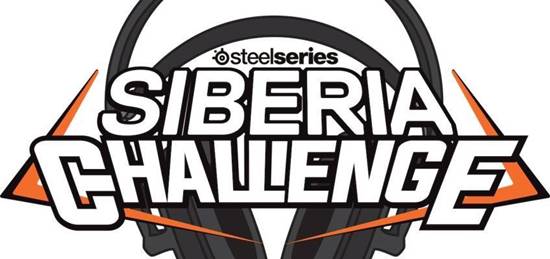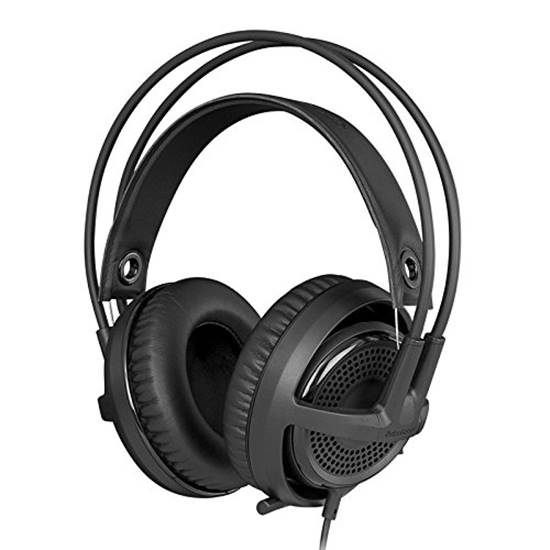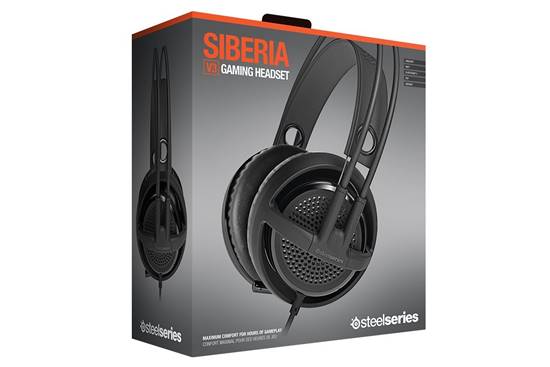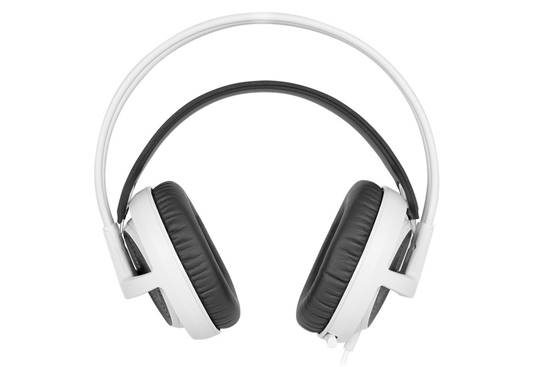 The SteelSeries Siberia v3 headset isn?t exactly a brand new release, considering it hit retail spaces late last year. But despite being a bit late to the review train, I can?t deny that this is one of the best gaming headsets you can pick up for $100 or less. I was given the opportunity to review the Siberia v3 as part of SteelSeries? current Siberia Challenge, wherein SteelSeries allows players the opportunity to contrast and compare their current headset of choice with the Siberia v3, something you can check out via this video on YouTube. As you can see, they?ve had some pretty good results, so I thought, sure, why not give the Siberia v3 a shot.
The SteelSeries Siberia v3 headset isn?t exactly a brand new release, considering it hit retail spaces late last year. But despite being a bit late to the review train, I can?t deny that this is one of the best gaming headsets you can pick up for $100 or less. I was given the opportunity to review the Siberia v3 as part of SteelSeries? current Siberia Challenge, wherein SteelSeries allows players the opportunity to contrast and compare their current headset of choice with the Siberia v3, something you can check out via this video on YouTube. As you can see, they?ve had some pretty good results, so I thought, sure, why not give the Siberia v3 a shot.
For my own comparison I opted to check out the Siberia v3 against a similar competitor, the Turtle Beach XO4. Both models are similarly priced, with an MSRP of around $99.99, and sale prices at sites like Amazon putting both the Siberia v3 and the Turtle Beach XO4 at $69.99 as of this review. Both have similar features, would appear to have similar sound quality, and can be used across a variety of devices and gaming systems.
 The biggest difference, right out of the box, is the design. The Siberia v3 sports a lighter frame than the XO4, featuring two, curved plastic rods connecting both ear pieces, with a strip of material that somewhat resembles a headband, which is the suspension design that was present on the Siberia v2. Compare this to the XO4, which is more traditional, featuring curved, hard plastic connecting the ear pieces with a bit of foam to cushion the spot where head meets headphone. The lightweight design of the Siberia v3 wins here, simply because it becomes easy to forget you?re even wearing a headset after a couple hours of gaming. This thing is remarkably light, and the memory foam ear cushions are large enough to fit just about any ear size, and do a solid job of cancelling out surrounding, outside noise.
The biggest difference, right out of the box, is the design. The Siberia v3 sports a lighter frame than the XO4, featuring two, curved plastic rods connecting both ear pieces, with a strip of material that somewhat resembles a headband, which is the suspension design that was present on the Siberia v2. Compare this to the XO4, which is more traditional, featuring curved, hard plastic connecting the ear pieces with a bit of foam to cushion the spot where head meets headphone. The lightweight design of the Siberia v3 wins here, simply because it becomes easy to forget you?re even wearing a headset after a couple hours of gaming. This thing is remarkably light, and the memory foam ear cushions are large enough to fit just about any ear size, and do a solid job of cancelling out surrounding, outside noise.
The Siberia v3 features a built-in microphone, with a retractable design that keeps it constantly attached to the headset, making it easy to conceal. It?s also on a flexible stem, as you?d expect to see out of most modern devices. Compare that to the XO4, which features a detachable mic piece also on a flexible stem. Considering my tendency to lose small things, this is another area where the Siberia v3 beats out the XO4.
 Both headsets feature a standard 3.5mm headphone jack, meaning you?ll be able to use them on pretty much any device you want. I tested the Siberia v3 on an iPhone, iPad, PS4, Xbox One, and PC, all of which were able to instantly pick up on the headset as a plugged in device with no trouble. While the standard headset cord for the Siberia v3 is a little short at 3 feet, it?s certainly long enough to be plugged into a controller or mobile device. For PC, the Siberia v3 has a dual 3.5mm PC adapter packed into the box, allowing you to split mic and audio, and extending the cable by another 7 to 8 feet. The only drawback, when compared to the XO4, is the lack of a packed in Xbox One headset adapter, necessary for use on the console. Of course, this is an accessory that can be bought separately, but having that packed in would certainly be a better option.
Both headsets feature a standard 3.5mm headphone jack, meaning you?ll be able to use them on pretty much any device you want. I tested the Siberia v3 on an iPhone, iPad, PS4, Xbox One, and PC, all of which were able to instantly pick up on the headset as a plugged in device with no trouble. While the standard headset cord for the Siberia v3 is a little short at 3 feet, it?s certainly long enough to be plugged into a controller or mobile device. For PC, the Siberia v3 has a dual 3.5mm PC adapter packed into the box, allowing you to split mic and audio, and extending the cable by another 7 to 8 feet. The only drawback, when compared to the XO4, is the lack of a packed in Xbox One headset adapter, necessary for use on the console. Of course, this is an accessory that can be bought separately, but having that packed in would certainly be a better option.
As far as audio quality goes, the Siberia v3 features a richer, more filling level of bass than the XO4 seemed to produce, across every device I tested it on. As far as general volume goes they?re pretty comparable, but that added boost of bass on the Siberia v3 helps to edge out the XO4. That said, it also has a somewhat negative impact on spoken dialogue in games. When playing Borderlands: The Handsome Collection on PS4, there was a slight echo or vibration to the voice track that was noticeable but not really overwhelming. However, switching over to XO4 made everything feel a little quieter, so it?s a small flaw in the Siberia v3 that I was more than willing to put up with for an overall richer soundscape.
 Likewise, the mic quality between the two are pretty comparable. I?ve seen some reports of people experiencing quiet mics with the Siberia v3, but I generally never had an issue with my voice output, or with other folks being able to hear me over mic. This is one area where both the Siberia v3 and the XO4 were remarkably, I had a hard time seeing any difference in overall volume or quality when it came to how both headsets picked up and outputted my own voice.
Likewise, the mic quality between the two are pretty comparable. I?ve seen some reports of people experiencing quiet mics with the Siberia v3, but I generally never had an issue with my voice output, or with other folks being able to hear me over mic. This is one area where both the Siberia v3 and the XO4 were remarkably, I had a hard time seeing any difference in overall volume or quality when it came to how both headsets picked up and outputted my own voice.
Overall, the SteelSeries Siberia v3 definitely edges out the Turtle Beach XO4 in a few areas, and for the asking price, I see no reason why you wouldn?t want to pick up the Siberia v3 if you?re in the market for a new headset. The overall comfortability of the headset is the number one selling point here, which is something I can?t overstate enough. But even the general sound quality, ease of use across a variety of platforms, and just the overall build of the headset are all great selling points too. It?ll certainly be my go-to headset for the foreseeable future, and I?d highly recommend checking out the Siberia v3 if you get the chance to do so. During the Siberia Challenge promotion, SteelSeries is offering a 30-day money back guarantee on the Siberia v3, which you can learn more about here.

